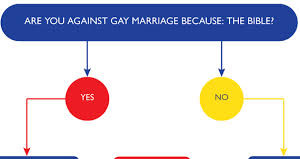There are several flow charts trying to show the ridiculousness of religious opposition to same-sex marriage by making three claims: (1) Leviticus forbids homosexuality, but it also bans a bunch of other stuff, and nobody [a.k.a., no Gentile] actually lives by all those rules; (2) Paul seems to forbid homosexuality, but actually means something like temple prostitution; and (3) Jesus doesn’t mention homosexuality. Here’s why none of those arguments work.
Author: Joe Heschmeyer
Felix Roma: The Role of Rome in the True Church
“O happy Rome, stained purple with the precious blood of so many princes!
You excel all the beauty of the world, not by your own glory,
but by the merits of the saints whose throats you cut with bloody swords.”
Three Rome-themed mini-posts to commemorate Sts. Peter and Paul: (I) the necessity of being united with the Roman Church, (II) the Roman Church not being the Seat of the Antichrist, and (III) an exciting new Catholic podcast centered around Rome.
All the (Involuntarily) Single Ladies
If you ever feel like a “vocational orphan,” wondering when or if God is ever going to lead you to a wedding ring or a religious habit, I know a Saint with some tough love for you.
Weak T: Transgenderism’s Philosophical Weaknesses
A lot’s been said about the case of Olympic decathalon Bruce Jenner’s decision to undergo a “sex change” operation, and to call himself “Caitlyn.” Unfortunately, a good deal of it has been sound and fury, signifying nothing: either cruel jokes at Jenner’s expense, or accusations of bigotry for anyone who hasn’t hopped on the transgender bandwagon. A better approach would be to soberly consider the underlying philosophical problems raised by transgenderism, and then suggest a positive way of responding to trans-identifying people. So that’s what I’ve tried to do here, beginning with:
The Heart of Justification
St. Paul reports that when he went to Corinth to preach the Gospel, he experienced fear and trembling in the face of such a great task, the task preaching the good news of justification. Nothing less than the fate of their souls hung in the balance. In much the same spirit of trembling I write to you today, hoping to propose anew the good news of justification. Specifically, I propose for your consideration that justification, rightly understood, resonates with the desire of the human heart to be truly good and approved as such.
The Poetry of the Saints
It’s not news to say that we Catholics struggle with beautiful music these days. More than two decades ago, Thomas Day released Why Catholics Can’t Sing: The Culture of Catholicism and the Triumph of Bad Taste, and the problems still exist. We mutter along with the responsorial Psalm; and mumble through the hymnody, with its milquetoast lyrics set… Continue reading The Poetry of the Saints
Saint Justin Martyr? Or Justin Idolater?
Early Christians like St. Justin Martyr and his companions died for the Christian faith, rather than worshipping idols. But if Protestants like Peter Leithart and Mike Grendon are right, these early Christians were idolaters anyways. Why? Because they believed in transubstantiation, that the bread and wine become the actual Body and Blood of Our Lord Jesus Christ. So are Protestants right? Should we call him “Justin Idolater” instead? Or can we trust the early Christians?
Is Limbo Closed? (Where Do Unbaptized Babies Go?)
Where do unbaptized babies go when they die? Catholics have traditionally said “to Limbo,” since they can’t go to Heaven (being unbaptized) or Hell (being without actual sin). But didn’t Pope Benedict XVI “close” Limbo a few years back?
Abortion, Souls, and the Atheist Conundrum
Do You Need God to Know That Abortion is Wrong? That’s a question that I asked recently here and over at Strange Notions. I was prompted by two things: on the one hand, a series of articles defending the idea that we can be moral without God; and on the other, articles like this one, suggesting that… Continue reading Abortion, Souls, and the Atheist Conundrum
Celibacy for War
Celibacy: it’s not just for priests and nuns, and it’s not just for life. Scripture also teaches that temporary celibacy is a way for laypeople to specially consecrate themselves to God.






